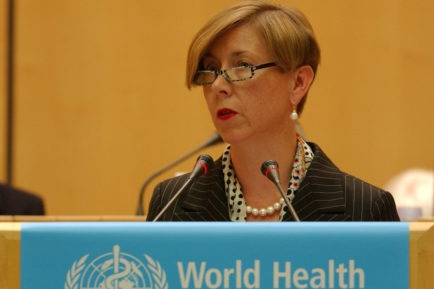It was my own personal experience with poor health as a small child that ignited in me a deep curiosity, respect and passion for the medical field.
I was born premature in Pakistan, not long after my parents had fled a war-ravaged Afghanistan. I obviously don’t remember how tiny and sickly I was as an infant – my mother sometimes recalls it though – but I do remember life as a four-year-old in the city of Quetta, spending most of my time being shuttled back and forth between our house and a rudimentary hospital and prescribed endless scripts of antibiotics that never seemed to work. I had contracted leishmaniasis – a disease transmitted by sand flies that are common in the Middle East and the tropics.
Years later, once my family and I had claimed asylum in Australia, I was treated as a young teenager for the scars that this condition had left me with at the Royal Children’s Hospital in Melbourne. I remember waking up from a surgical procedure and opening my eyes to find a nurse gently reaching for my hands, asking me how I was feeling and propping me up with an extra pillow. At the same time, she reassuringly wrapped an arm around my nervous mother. It was at that moment that I knew I wanted to follow in this woman’s footsteps and forge a career in supporting the sick and those in need.
The more I learned of Australia’s medical sector the more inspired I was: through natural disasters such as this year’s tragic bushfires to pandemics such as the one we are now facing, this was a public system there to serve all of the country’s people. It was a far cry from my experience of the hospitals in the developing world.
Just a few months ago, I was beginning my final year of my two-year diploma of nursing. There was a buzz in the classroom those first few weeks; my fellow students and I were excited to be beginning our placements for the year. I had mapped out my career carefully – once I graduated, I would begin working straight away as an Enrolled Nurse to help support my family. I was also planning to simultaneously study a Bachelor of Nursing so that I could become a Registered Nurse as soon as possible.
Then the COVID-19 tsunami hit and everything seemed to change in an instant. It was hard to look away from the horrifying news footage rolling in from some of the world’s wealthiest countries. I shuddered to think of how Pakistan’s fragile healthcare infrastructure would hold up.
These distressing images created an uncertain and anxious mood in the classroom. As a nursing student, I had expected my final year to go smoothly: it was a year to be filled with many hands-on practical placements and tests to enhance my skills and knowledge. Yet as the seriousness of the pandemic began to unfold, our teachers announced a raft of changes to our nursing course. Practical tests were cancelled, important hospital placements and exams were postponed, and lectures and tutorials moved to an online, remote learning model. My nursing friends and I became demotivated and stressed. We gain the most value out of our nursing education through physical, kinaesthetic experiences and activities rather than listening to lectures or watching online video demonstrations. It is crucial for nursing practicals to be performed face-to-face rather than online because it ensures we are competent to perform the procedure safely and correctly in a real clinical setting.
My parents also began expressing alarm: what if their daughter was pulled in to a COVID-19 ward to assist? What if she contracted the illness and became sick again?
I am grateful that my nursing school and teachers acknowledged our concerns and pivoted, implementing new measures as Australia began to get a hold of the virus. Recently, our teachers scheduled one day a week of in-person classes to prepare us for our Objective Structured Clinical Examination (OSCE), a hands-on exam designed to test our clinical skills, knowledge and performance. We would visit campus, get our temperature checked at the door, change into our nursing attire and perform our tests, all while socially distancing from teachers and other students and ensuring appropriate healthcare measures were adhered to.
I’m also immensely proud of Australia’s successes in flattening the COVID-19 curve. The state and federal governments acted swiftly to implement lock downs and encourage people to stay at home. It worked. Not only did this stop the spread of COVID-19, but it also gave our hospitals crucial time to prepare for patients. With less than 7,000 confirmed cases (more than 6,000 of those recovered) and less than 100 deaths, we are being held up as a success story.
Still, I am having trouble overcoming the anxiety I face with the uncertainty this pandemic has brought. I worry about the less privileged people around the world that don’t have access to clean water, soap and information on COVID-19 prevention that is crucial in protecting against the virus. I worry about the refugees – like my own family and myself once were – who are packed into dense, crowded refugee camps where social distancing is a luxury.
I worry about the 743 million girls that are currently out of school due to COVID-19 closures, of which more than 111 million are living in the world’s least developed countries where access to education is already a struggle. And while transitioning to online learning has been hard for us nursing students here in Australia, at least we are lucky enough to have that option. I am a youth activist leader with the charity Plan International Australia, and in some of the vulnerable communities that we work in, boys are 1.8 times more likely to own a smartphone that can access the internet than girls. When girls are out of school they also struggle to access social support structures and essential services such as sexual and reproductive health services, and aid workers fear that many of these girls may not return to school once they reopen. They are more likely to suffer gender-based violence and forced child marriages.
I also often stay up late wondering how I can help at this critical time while balancing my studies and part-time work. Most of our clinical placements for the year have now been cancelled, and some of the bigger metropolitan hospitals have ceased contact with nursing students. Some regional hospitals are still accepting placements and volunteer work, but it is difficult for many of us students to afford the transport and accommodation there, or to fit the travel time in.
What’s more, international students or those on temporary visas, such as myself, are not eligible for JobSeeker or JobKeeper payments. This compounds the stresses we already have.
I would like to volunteer at a hospital but right now it is financially impossible for me to do so.
I am confident and eager to start working in an Australian hospital because I know I will be protected and supported by an experienced team, with available PPE and plenty of resources. My family, too, have had their anxieties allayed by the strong performance of Australia’s healthcare system. The government must support all student healthcare workers both financially and through making critical placements available or that we receive placement credit for volunteer hours we undertake. We are assets to the healthcare system. By helping us, the strain on current practicing nurses will be reduced – it will give them a minute to breathe, see a counsellor or their loved ones, and, most importantly, to rest.
Laila Yaqoobi, 19, is a youth activist with Plan International Australia, the charity for girls’ equality.






